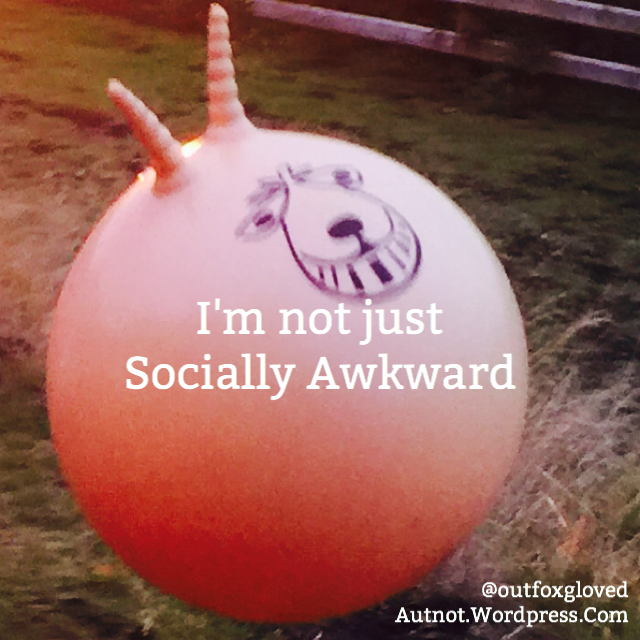While we know that the majority of autistic people experience abuse and sexual assault during their lifetimes, autistic women are particularly vulnerable, and we need more research in this area.
Tag: women
Do autistic people suffer? Sadly yes, lots of us do. Do we suffer from autism? No, I do not think so. That is why I do not hate autism.
Photo courtesy the author [image: Blurry photo of a pink ride-on bouncy balloon with an animal face and two “horns” for handles. Overlaid white text reads, “I’m not just socially awkward.” Smaller white text in the lower right corner reads, “@oufoxgloved” and “Autnot.Wordpress.com”] Rhi Lloyd-Williams autistrhi.com When I tell people I’m autistic, it usually goes one of two ways; either they can’t make me fit into their idea of what autism is and completely reject it, or they mark me down as “socially awkward” and leave it there. Autism explains my lack of constant contact, it explains my monologuing about things that interest me, it explains why on social occasions I move around a room like a loose cog in a machine—catching on things, getting stuck in places, jarring against this and that before being knocked into a corner and staying there. Those are the things about me that you…
TPGA is observing Autism Acceptance Month by featuring accounts from autistic people about the differences accommodations (or lack thereof) make in their lives. Today, British autistic filmmaker and author Carly Jones outlines her “Top five understandings previous Autistic generations did not have, that the next Autistic generation must have as standard.” Carly Jones www.facebook.com/olley.edwards Carly and her family [image: A laughing white woman with long dark hair, lying on a striped blanket with her three children.] 1) See autism as a real disability Disability is not a dirty word, though it feels that way to some — we are all too often encouraged to see disability as “less than” “inferior,” or “disadvantaged.” I see disability as someone having a different experience of the world than is “typical.” Although Theory of Mind (lack of pre-installed knowledge that other people’s thoughts, wants, and agendas may differ from one’s own) is noted as…
TPGA is observing Autism Acceptance Month by featuring accounts from autistic people about the differences accommodations (or lack thereof) make in their lives. Today, five women talk about about the under-recognition of autistic girls, the long- and short-term effects of going without supports and accommodations, and what autistic girls and actually need to succeed and be happy. Photo: Steven Depolo (Flickr) [image: Two smiling African-American girls, on a swing set.] Autism is different for girls, and not only because fewer girls than boys get autism diagnoses. Autistic women and girls tend to have different traits than autistic boys do, and are also socialized differently — leading to many of those girls being overlooked or misdiagnosed well into adulthood, plus leading most of their life without the supports that could have made their lives much easier. It gets even more complicated when autistic girls are also racial minorities, and/or from low-income…
…One Unicorn at a Time. Carol Greenburg aspieadvocate-ascd.blogspot.com We Unicorns seldom have a chance to gather in the magical wild lands of Manhattan, but thanks to a press pass arranged by Sharon daVanport, president of Autism Women’s Network, I got to meet another of my species at a panel entitled Autistic and Female: They say That’s Rare and so Many Other Things at the Disability Studies in Education conference at Hunter College, on May 27: Dr. Elizabeth “Ibby” Grace. With a generous dollop of the whimsy autistic people are alleged to lack, Dr. Grace, an assistant Professor with the Diversity in Learning and Teaching Department and research methodologist at Louis University in Chicago, used her unicorn analogy to expose the myth behind the assumption that females with autism are rare. In fact, Dr. Grace maintains, autistic girls and women like her, and like me, are everywhere, but vastly under-identified and…
S. Begeer VU University, Amsterdam Autism is a “man’s disorder” But what about the “Horse Girl” and the “Rain Women”? Some studies reports that females with autism Show more cognitive impairments Have worse social and communicative functioning Have a higher rate of intellectual disability: Increased self-destructive behavior, more dementia But other studies have shown that core autism symptoms do not vary by sex: No increase in psychiatric comorbidity Core symptoms of autism are relatively equal What are factors in the identification of females with autism? Parental expectations may be involved (higher social expectations) Clinicians expectations may be involved as well There is a risk of delayed or missed diagnoses in females Early identification is crucial From the abstract: imfar.confex.com/imfar/2011/webprogram/Paper8847.html Survey data were collected in the Netherlands from 2275 individuals with ASD. Timing and procedure of diagnosis were compared for males and females with autism, Asperger’s syndrome and PDDNOS. Results: Among…





